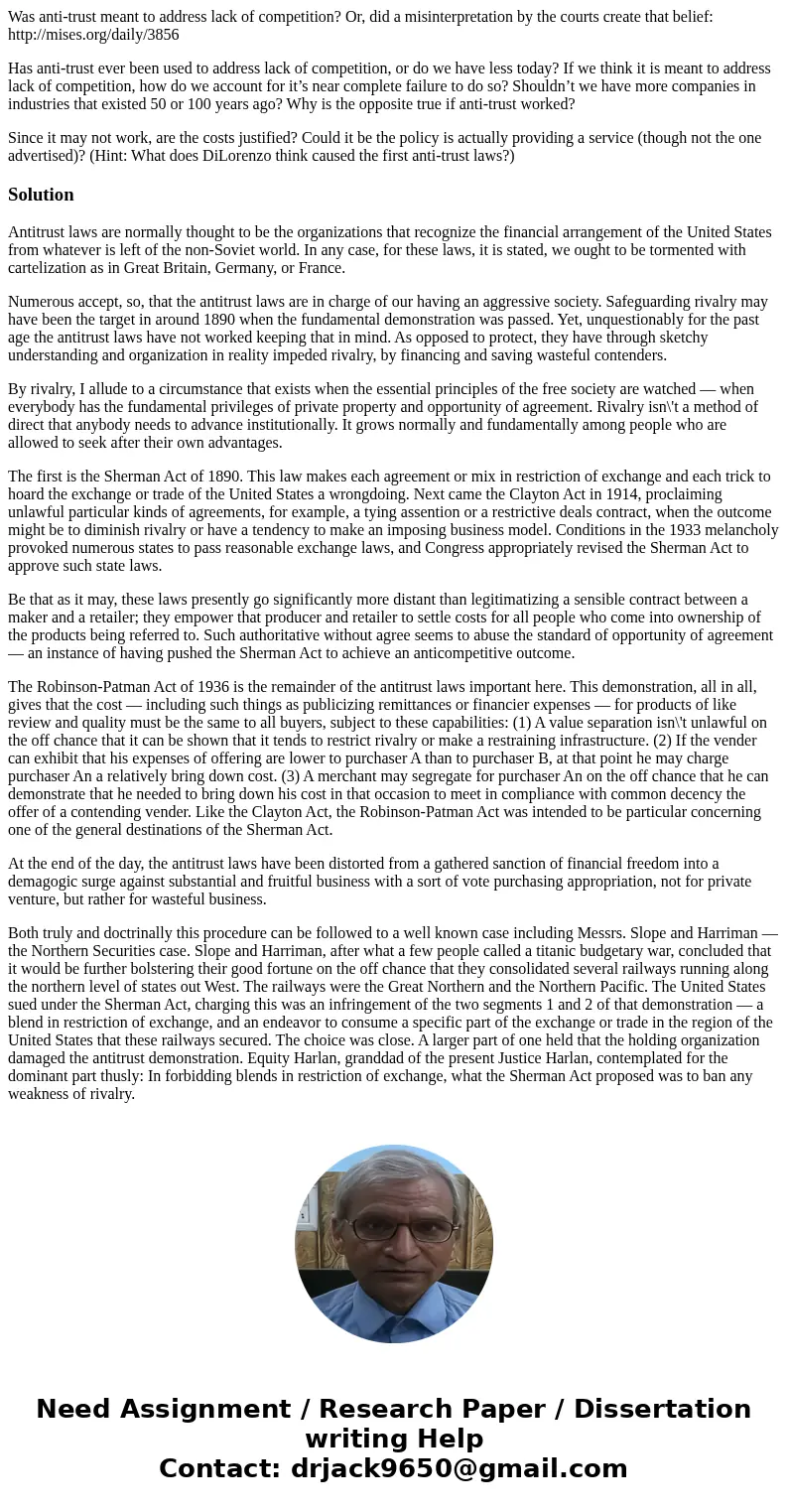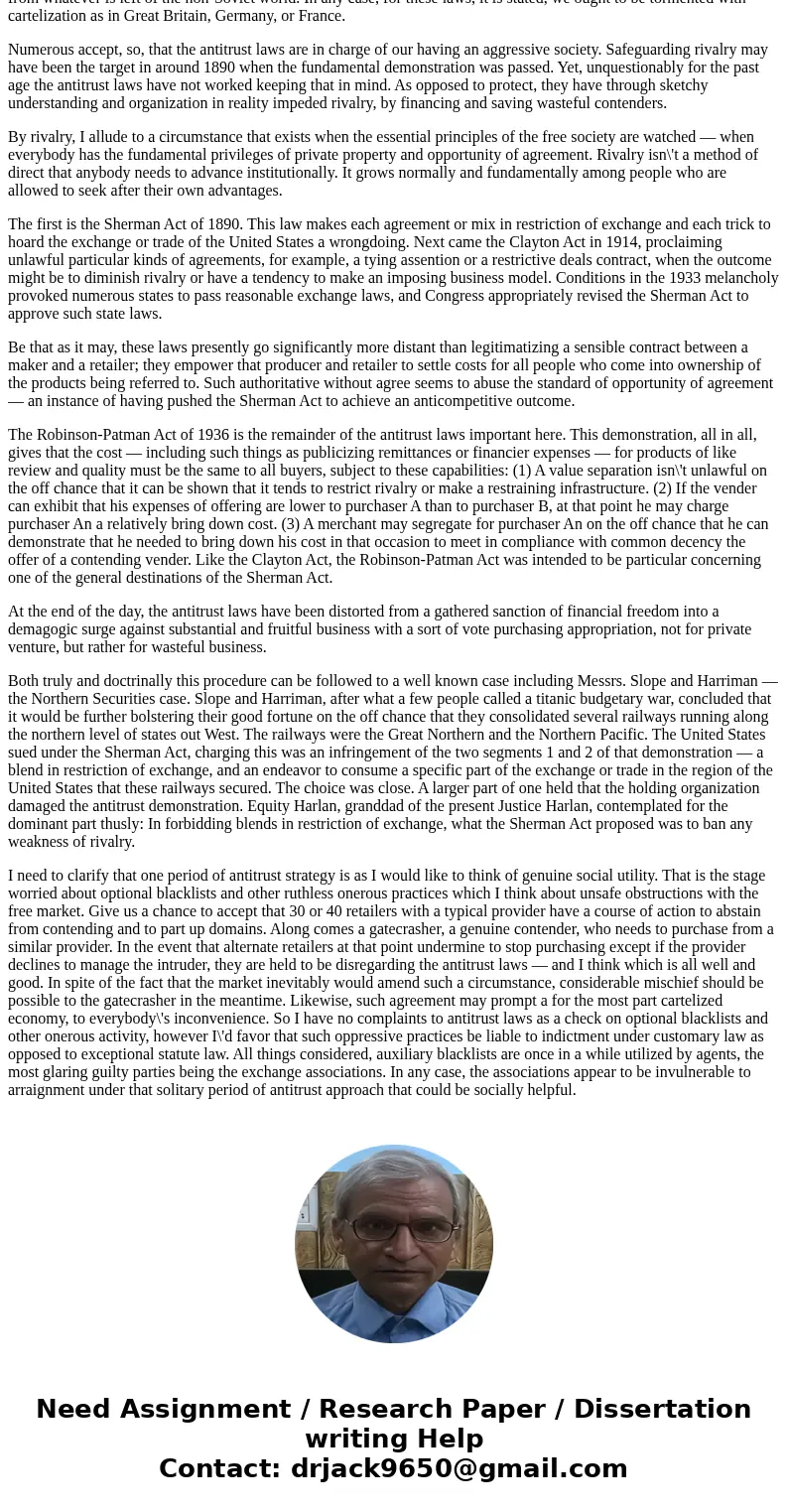Was antitrust meant to address lack of competition Or did a
Was anti-trust meant to address lack of competition? Or, did a misinterpretation by the courts create that belief: http://mises.org/daily/3856
Has anti-trust ever been used to address lack of competition, or do we have less today? If we think it is meant to address lack of competition, how do we account for it’s near complete failure to do so? Shouldn’t we have more companies in industries that existed 50 or 100 years ago? Why is the opposite true if anti-trust worked?
Since it may not work, are the costs justified? Could it be the policy is actually providing a service (though not the one advertised)? (Hint: What does DiLorenzo think caused the first anti-trust laws?)
Solution
Antitrust laws are normally thought to be the organizations that recognize the financial arrangement of the United States from whatever is left of the non-Soviet world. In any case, for these laws, it is stated, we ought to be tormented with cartelization as in Great Britain, Germany, or France.
Numerous accept, so, that the antitrust laws are in charge of our having an aggressive society. Safeguarding rivalry may have been the target in around 1890 when the fundamental demonstration was passed. Yet, unquestionably for the past age the antitrust laws have not worked keeping that in mind. As opposed to protect, they have through sketchy understanding and organization in reality impeded rivalry, by financing and saving wasteful contenders.
By rivalry, I allude to a circumstance that exists when the essential principles of the free society are watched — when everybody has the fundamental privileges of private property and opportunity of agreement. Rivalry isn\'t a method of direct that anybody needs to advance institutionally. It grows normally and fundamentally among people who are allowed to seek after their own advantages.
The first is the Sherman Act of 1890. This law makes each agreement or mix in restriction of exchange and each trick to hoard the exchange or trade of the United States a wrongdoing. Next came the Clayton Act in 1914, proclaiming unlawful particular kinds of agreements, for example, a tying assention or a restrictive deals contract, when the outcome might be to diminish rivalry or have a tendency to make an imposing business model. Conditions in the 1933 melancholy provoked numerous states to pass reasonable exchange laws, and Congress appropriately revised the Sherman Act to approve such state laws.
Be that as it may, these laws presently go significantly more distant than legitimatizing a sensible contract between a maker and a retailer; they empower that producer and retailer to settle costs for all people who come into ownership of the products being referred to. Such authoritative without agree seems to abuse the standard of opportunity of agreement — an instance of having pushed the Sherman Act to achieve an anticompetitive outcome.
The Robinson-Patman Act of 1936 is the remainder of the antitrust laws important here. This demonstration, all in all, gives that the cost — including such things as publicizing remittances or financier expenses — for products of like review and quality must be the same to all buyers, subject to these capabilities: (1) A value separation isn\'t unlawful on the off chance that it can be shown that it tends to restrict rivalry or make a restraining infrastructure. (2) If the vender can exhibit that his expenses of offering are lower to purchaser A than to purchaser B, at that point he may charge purchaser An a relatively bring down cost. (3) A merchant may segregate for purchaser An on the off chance that he can demonstrate that he needed to bring down his cost in that occasion to meet in compliance with common decency the offer of a contending vender. Like the Clayton Act, the Robinson-Patman Act was intended to be particular concerning one of the general destinations of the Sherman Act.
At the end of the day, the antitrust laws have been distorted from a gathered sanction of financial freedom into a demagogic surge against substantial and fruitful business with a sort of vote purchasing appropriation, not for private venture, but rather for wasteful business.
Both truly and doctrinally this procedure can be followed to a well known case including Messrs. Slope and Harriman — the Northern Securities case. Slope and Harriman, after what a few people called a titanic budgetary war, concluded that it would be further bolstering their good fortune on the off chance that they consolidated several railways running along the northern level of states out West. The railways were the Great Northern and the Northern Pacific. The United States sued under the Sherman Act, charging this was an infringement of the two segments 1 and 2 of that demonstration — a blend in restriction of exchange, and an endeavor to consume a specific part of the exchange or trade in the region of the United States that these railways secured. The choice was close. A larger part of one held that the holding organization damaged the antitrust demonstration. Equity Harlan, granddad of the present Justice Harlan, contemplated for the dominant part thusly: In forbidding blends in restriction of exchange, what the Sherman Act proposed was to ban any weakness of rivalry.
I need to clarify that one period of antitrust strategy is as I would like to think of genuine social utility. That is the stage worried about optional blacklists and other ruthless onerous practices which I think about unsafe obstructions with the free market. Give us a chance to accept that 30 or 40 retailers with a typical provider have a course of action to abstain from contending and to part up domains. Along comes a gatecrasher, a genuine contender, who needs to purchase from a similar provider. In the event that alternate retailers at that point undermine to stop purchasing except if the provider declines to manage the intruder, they are held to be disregarding the antitrust laws — and I think which is all well and good. In spite of the fact that the market inevitably would amend such a circumstance, considerable mischief should be possible to the gatecrasher in the meantime. Likewise, such agreement may prompt a for the most part cartelized economy, to everybody\'s inconvenience. So I have no complaints to antitrust laws as a check on optional blacklists and other onerous activity, however I\'d favor that such oppressive practices be liable to indictment under customary law as opposed to exceptional statute law. All things considered, auxiliary blacklists are once in a while utilized by agents, the most glaring guilty parties being the exchange associations. In any case, the associations appear to be invulnerable to arraignment under that solitary period of antitrust approach that could be socially helpful.


 Homework Sourse
Homework Sourse